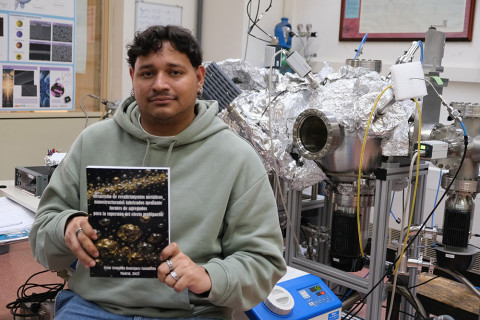César Rodríguez is defending his thesis: "The lesson I value the most is understanding how research can become a practical solution"

César Rodríguez is finishing his path: on November, 28, he will defend his thesis, entitled 'Development of nanostructured metallic coatings fabricated by means of aggregate sources for the suppression of the multipactor effect': "This industrial PhD has been carried out under the collaboration between the Instituto de Ciencia de Materiales de Madrid (ICMM-CSIC) and the company Nanostine. At ICMM, my academic supervisor has been Dr. Yves Huttel, from the Low Dimensional Materials group. At Nanostine, my industrial supervisor has been Dr. Iván Fernández," he says.
Why did you choose ICMM for your PhD?
I chose ICMM because the LAM group is a leading reference in the growth and characterization of nanostructured materials. In recent years, they have developed cutting-edge technologies in surfaces, interfaces, and nanoparticles, resulting in several licensed patents and the creation of spin-offs. They also have a unique capability to produce nanoparticles with precise control over size, composition, and structure, enabling real application opportunities. It was the ideal environment to carry out a PhD with both scientific and technological impact.
How would you explain your research to a non-scientific audience?
My research focuses on preventing a type of electrical breakdown that can happen in devices used in satellites. When these devices operate in space, electrons can bounce around inside them and multiply uncontrollably, which may cause failures. What I do is design and test very thin protective coatings made of tiny particles of gold and silver. These coatings are engineered so that they can trap the electrons instead of letting them multiply. In this way, we help make space communication systems safer and more reliable.
What are the main applications of your research? Could you give us an example?
My PhD project has been industrial, with a clear focus on real applications. The coatings we develop are designed to be directly implemented in high-power radiofrequency components such as filters, waveguides, resonant cavities, or amplifiers used in satellites. By reducing the risk of electrical breakdown, they help improve the reliability and lifetime of space communication systems.
What are the lessons you have learnt here? Which one do you value the most?
During my PhD I have learned how to lead a research project that connects fundamental science with industrial needs. I strengthened my skills in advanced nanomaterial fabrication and characterization, but also in teamwork, communication, and adapting to real engineering challenges.
The lesson I value the most is understanding how research can become a practical solution. Working in an industrial PhD taught me to think not only about scientific results, but also about how to bring them to application, ensuring that what we develop in the lab can be transferred to technology that improves real systems.
How do you think this experience will contribute to your training and to your future?
This experience has given me a solid background in both cutting-edge nanomaterials research and real industrial requirements. I have learned how to transform scientific ideas into technologies that can be implemented in high-performance systems, especially in the space and energy sectors.
In the future, this will allow me to contribute to innovation projects where reliability, advanced materials, and system integration are key aspects. It has shaped my career towards becoming a researcher and engineer capable of developing solutions that move from the laboratory to real applications.
What are your plans once you finish your PhD?
My PhD contract ends on November 28th, and I will continue working at Nanostine as a researcher in the R&D department starting on December 1st. I am excited to keep developing advanced materials with direct industrial applications and to contribute to new technological solutions in high-performance sectors such as space and energy.
Why did you become a scientist? Who have been your role models?
I became a scientist because I’ve always been curious about how things work and how we can use that knowledge to solve real problems. I enjoy asking questions, experimenting, and finding practical solutions that can improve technology. Regarding role models, I have been especially inspired by my supervisor, Dr. Yves Huttel, and our colleague, Dr. Lidia Martínez. Their passion for science, their commitment to high-quality research, and their ability to connect fundamental knowledge with real applications have guided me throughout my PhD and continue to motivate my career.
Instituto de Ciencia de Materiales de Madrid (ICMM)
Sor Juana Ines de la Cruz, 3
Cantoblanco, 28049
Madrid, España
Telephone: (+34) 91 334 90 00
Email: @email
Communication Office: @email

Acknowledge the Severo Ochoa Centres of Excellence program through Grant CEX2024-001445-S/ financiado por MICIU/AEI / 10.13039/501100011033

Contacto | Accesibilidad | Aviso legal | Política de Cookies | Protección de datos